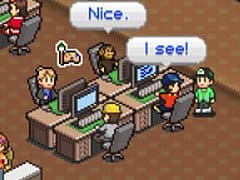Video Gamer is reader-supported. When you buy through links on our site, we may earn an affiliate commission. Prices subject to change. Learn more
That guy who runs the game studio that specialises in golf RPGs? That’s me. “Dave Jones’ Old College Try” might not be a household name yet, but we’re the most reliable suppliers of casual sport adventure on the Game Kid console. Fancy a nice animal-based FPS? I’ve got you covered – at least until I get bored of my employees and get a bit too trigger-happy with the “fire” button. Another day, another dollar at ol’ DJOCT. Sure, I don’t give my workers any downtime, but I find as long as you drip-feed them Dead Bull they have enough energy to power a small house in Da Nang.
This is Games Dev Story: ostensibly a management game that puts you at the head of a small games studio in the early 1980s. For the next two in-game decades you’ll be establishing yourself in the industry, attempting to keep up with new console technology, competing against rival studios for awards, continuously trying to weed out the weaker stafflings, finding new employees with better stats, deciding whether to go for a contract job or develop a new IP, and hoping those bloody journalists will give you a score higher than a 7. Imagine Theme Hospital if it had been designed for a demographic of games history buffs and armchair designers, and you have Games Dev Story.
At most stages of the development process you’re faced with difficult decisions. Do I churn out mindless games for a cheap buck, or do I try to develop a title for the latest popular console and lose money on the licensing fee? Do I take a chance and boost my game’s graphics or sound, or should I keep it simple in order to avoid bugs? Should I cough up a few thousand dollars to get booth babes to advertise my game at the Gamedex show or keep it cheap so I can afford to make better games? Should I get the game’s graphics outsourced by talented albeit expensive professionals, or use my fresh-faced and slightly useless office dwellers? It’s a level of complexity that’s immensely refreshing for such a little game.
And it is little. It’s been developed by Japanese studio Kairosoft, who seem to have made a business out of creating tiny management titles – most of them have yet to make it to the Western market, from the look of it. But GDS’ appeal is how comfortable it is in its nicheness. Throughout the game’s 20 year campaign you’re hit with waves of cunningly quirky nostalgia. Half the fun is discovering new systems, from the Game Kid to the Senga Uranus to the Sonny PlayStatus to the Whoop.
When they’re done well enough, management sims can give insight into the decisions and pressures of the guys in charge. And with the amount of relatively legitimate development-isms that pop up over the lifespan of your game studio, you can’t help but feel a slight pang of empathy for the guys making the real things. But don’t worry, that wears off. Soon all you’ll care about is getting Game of the Year over those damned Circle Enix guys and spending five consecutive hours trying to get a decent score.
